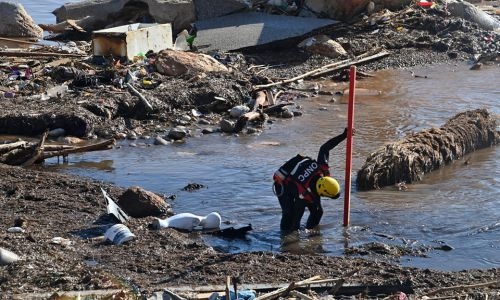UN warns of disease threat in flood-ravaged east Libya
AFP | Derna, Libya
The Daily Tribune – www.newsofbahrain.com
The UN on Monday warned that disease outbreaks could bring "a second devastating crisis" to Libya a week after a massive flash flood devastated the coastal city of Derna, sweeping thousands to their deaths.
Local officials, aid agencies and the World Health Organization "are concerned about the risk of disease outbreak, particularly from contaminated water and the lack of sanitation", the United Nations said.
The flash flood that has killed nearly 3,300 people and left thousands more missing came as the war-scarred North African country was lashed by the hurricane-strength Storm Daniel on September 10.
Tens of thousands of traumatised residents are now homeless and badly in need of clean water, food and basic supplies amid a growing risk of cholera, diarrhoea, dehydration and malnutrition, UN agencies have warned.
As rescue teams from several European and Arab countries kept up the grim search for bodies in the mud-caked wasteland of smashed buildings, crushed cars and uprooted trees, Derna survivors recounted the horror of the events.
"I took nothing but my glasses and phone and fled while water was shaking the iron doors like an earthquake," the Abdel Moneim Awad al-Sheikh, 73, who was awakened in the pre-dawn hours by the sound of screams and rushing water.
He escaped with his wife by climbing up from his first floor apartment to the roof of the building with other family members.
- Bodies and disease -
Mohamed Abdelhafiz, a 50-year-old Lebanese man who has lived in Derna for decades, recalled that he "saw death".
"This whole area, from my house to the wadi (dry riverbed), had three or four buildings. Now, there is nothing. The ground is just mud, as though there never were any buildings here."
Amid the chaos, the true death toll remained unknown, with untold numbers swept into the sea.
Soldier Hamza Al-Khafifi, 45, described to AFP finding the unclothed bodies of "old, young, women, men and children" washing up on the shore a week after the disaster.
"Bodies were stuck between rocks."
The health minister of the eastern administration, Othman Abdeljalil, has said that 3,283 people were now confirmed dead in Derna.
Libyan officials and humanitarian organisations have warned, however, that the final toll could be much higher with thousands still missing.
Five members of a Greek rescue team were killed in a road accident while travelling from Benghazi to Derna on Sunday, Greek officials said.
Abdeljalil said their vehicle collided with a car carrying a Libyan family, three of whose members died while two others were seriously injured.
Emergency response teams and aid have been deployed from France, Greece, Iran, Russia, Saudi Arabia, Tunisia, Turkey and the United Arab Emirates.
On Monday the UN mission in Libya said nine United Nations agencies were involved in efforts to deliver aid and support to survivors.
The United Nations has launched an aid appeal for more than $71 million.
- Political divisions -
In the face of the tragedy, rival Libyan administrations appear to have set aside their differences after calls from aid groups and several countries to close ranks and collaborate in the aid effort.
Libya has been split between two rival governments -- a UN-backed administration in the capital Tripoli and another in the disaster-hit east -- since the overthrow and killing of dictator Moamer Kadhafi in a 2011 NATO-backed uprising.
The International Organization for Migration's Libya chief Tauhid Pasha posted on X that the aim now was to channel all authorities "to work together, in coordination".
On Monday the Tripoli-based government announced the launch of work to build a temporary bridge that would span the wadi that cuts through Derna.
The massive flooding caused two upstream river dams in Derna to rupture, sending a late-night tidal wave crashing through the centre of the city of 100,000 and sweeping entire residential blocks into the Mediterranean.
The rushing waters submerged a six-square-kilometre (2.3-square-mile) densely-populated area in Derna, damaging 1,500 buildings of which 891 were totally razed, according to a preliminary report released by the Tripoli government based on satellite images.
UN experts have blamed the high death toll on climatic factors as the Mediterranean region has sweltered under an unusually hot summer, and on the legacy of Libya's war that has depleted its infrastructure, early warning systems and emergency response.
Related Posts

